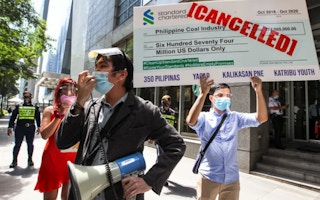Standard Chartered Bank has come under fire for undermining its own climate commitment by vying for a deal to finance a new gas-fired power plant in Thailand.
To continue reading, subscribe to Eco‑Business.
There's something for everyone. We offer a range of subscription plans.
- Access our stories and receive our Insights Weekly newsletter with the free EB Member plan.
- Unlock unlimited access to our content and archive with EB Circle.
- Publish your content with EB Premium.
The British bank, which specialises in emerging markets, is in line to fund a US$700 million, 1.4 gigawatt gas-fired power plant in Ratchaburi, a province west of Bangkok.
The deal clashes with Standard Chartered’s commitment, made in October last year, to align with the Paris climate accord and achieve net-zero emissions from its financed activity by 2050, environmental campaign group Market Forces said in a statement, released on Tuesday.
StanChart’s interest in the Ratchaburi gas deal comes as the Asia Infrastructure Investment Bank pulled out, citing a misalignment with its climate policy, according to a report by infrastructure finance publication IJGlobal.
StanChart’s climate policy targets a 30 per cent reduction in the emissions intensity of oil and gas projects by 2030, with the caveat that “progress won’t be linear” and the production of natural gas may rise before it falls “as it replaces more carbon-intensive alternatives” such as coal.
“
Any bank with a net zero by 2050 goal — like Standard Chartered — that isn’t adhering to the IEA’s call for zero fossil fuels expansion, or making plans to adhere to it, is greenwashing.
Adam McGibbon, United Kingdom campaign lead, Market Forces
Market Forces and the Friends Provident Foundation are calling on Standard Chartered to match its mid-century net-zero declaration with global climate targets and stop fossil fuel financing completely, by lodging a shareholder resolution at the bank’s annual general meeting later in the year.
The resolution requires StanChart to align its financing activity with the findings of a report by International Energy Agency (IEA) last May, which warned that in order to curb emissions to net-zero by 2050, and avoid the most severe consequences of climate change, all fossil fuels extraction must end.
StanChart is the biggest UK-based financier of new coal development in Asia, continues to fund the expansion of oil and gas firms, and has provided more than US$24 billion to the fossil fuel sectors since the signing of the Paris climate treaty, the resolution asserts.
StanChart is set to release an update on its climate plans on Thursday, in its annual report.
Adam McGibbon, United Kingdom campaign lead at Market Forces, said that the bank should be judged on its actions, “not the words that will be in the annual report this week.”
“The bank is addicted to fossil fuels and is continuing to expand the fossil fuel industry. Investors have an opportunity to change that at the coming AGM by voting for the resolution and aligning the bank’s ‘net zero’ target with a net zero pathway.”
Standard Chartered has not responded to Eco-Business’ request for comment.
A report named the Global Coal Exit List, published on Wednesday by non-governmental organisations including Urgewald and 350.org Japan, found that between January 2019 and November 2021, Standard Chartered had financed coal-linked companies, mainly in Asia, to the tune of US$9.5 billion.
The bank was targeted by green groups in January for being part of a financing consortium for a natural gas project in Western Austraila, Scarborough LNG, that environmentalists say would generate more carbon emissions than 15 coal-fired power stations.
McGibbon told Eco-Business that French bank La Banque Postale is an example of best practice in fossil fuel divestment. In October last year, it committed to immediately “refrain from financing oil and gas energy projects”, “no longer providing financial services” to upstream and midstream oil and gas companies, and “a complete withdrawal from fossil fuels by 2030”.










